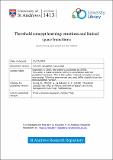Threshold concept learning : emotions and liminal space transitions
Abstract
This article explores how learners transition through the liminal space when they engage with and master threshold concepts. We investigate this question through a qualitative study of undergraduate students as they grapple with the threshold concept of Evidence-based Management as a disciplinary way of thinking and practising. Our findings elaborate threshold concept learning as a cumulative process of learner engagement with the troublesome, integrative-and-bounded, irreversible, and transformative elements of a threshold concept. Through this elaboration, we show how transitions through liminal spaces in threshold concept learning play out as an interrelated cognitive and affective process. We identify key transition points and mechanisms related to doubt, high-activation negative emotions, regret, and emotional resolution that trigger entry into, progression through or getting stuck within, and exit from a liminal space when a learner engages with and masters a threshold concept. Our research therefore contributes processual insight into liminality in threshold concept learning by opening up the transitions and emotions that play out for learners in the liminal space. We also contribute to wider debates about student engagement with disciplinary ways of thinking and practising in management.
Citation
Irving , G , Wright , A & Hibbert , P 2019 , ' Threshold concept learning : emotions and liminal space transitions ' , Management Learning , vol. OnlineFirst . https://doi.org/10.1177/1350507619836062
Publication
Management Learning
Status
Peer reviewed
ISSN
1350-5076Type
Journal article
Description
Funding that contributed to this research was provided by a 2014 PELT award from the Australian and New Zealand Academy of Management.Collections
Items in the St Andrews Research Repository are protected by copyright, with all rights reserved, unless otherwise indicated.

